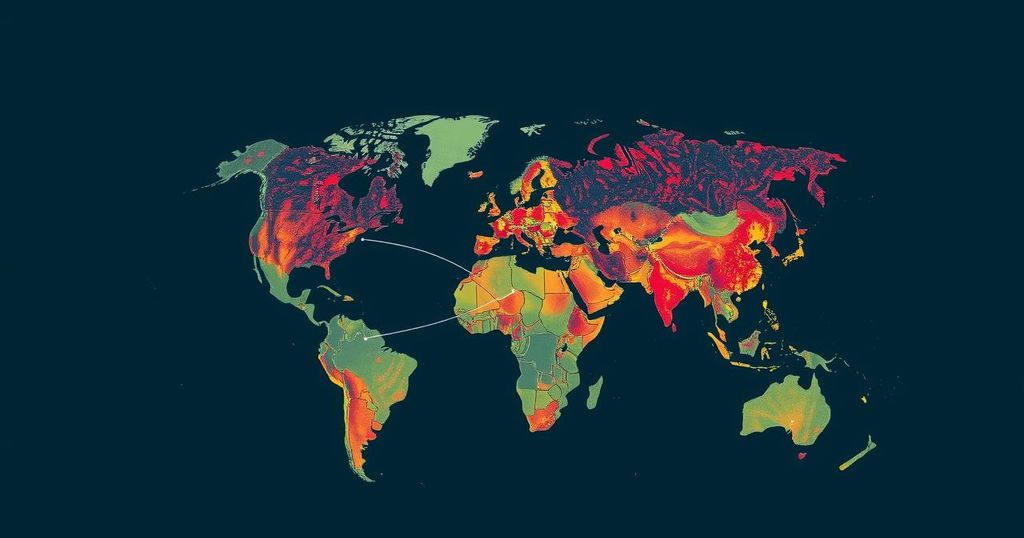A recent report indicates that climate change poses severe health risks worldwide, with unprecedented levels of threats including increased deaths due to heat and the spread of infectious diseases as well as food insecurity resulting from extreme weather events. Urgent action is needed to address these challenges as the world approaches COP29 discussions and overall climate change policy shifts.
A comprehensive report indicates that climate change is increasingly endangering human health in unprecedented ways, with experts asserting that the consequences of inaction can be measured in lost lives. This report coincides with alarming global phenomena including heatwaves, wildfires, hurricanes, droughts, and floods, and is released amidst concerns that 2023 may become the hottest year on record. It comes in a critical political context, just ahead of the United Nations COP29 climate talks in Azerbaijan and a US election potentially favoring climate change skepticism. The eighth edition of the Lancet Countdown on health and climate change, prepared by 122 professionals, including members from UN agencies like the World Health Organization, highlights severe issues stemming from climate change. Of the 15 metrics analyzed over the past eight years, 10 have reached alarming new levels. Among the most troubling findings are increased instances of extreme weather, a dramatic rise in heat-related deaths among the elderly, the proliferation of infectious diseases, and food insecurity resulting from agricultural damage due to weather extremes. Marina Romanello, executive director of Lancet Countdown, stated that the findings underline health threats witnessed across all nations, at unprecedented levels. The report reveals that the number of heat-related deaths among individuals aged 65 and older has surged by 167 percent since the 1990s. Furthermore, climate change is contributing to the expanded habitat of mosquitoes, which has led to a record of over five million dengue cases globally in the previous year. Additionally, the report noted significant deforestation between 2016 and 2022, with around five percent of global tree cover lost, thereby diminishing the planet’s ability to absorb carbon dioxide emissions. There is a noted correlation between rising greenhouse gas emissions and the actions of fossil fuel companies and government subsidies supporting fossil fuel production—totaling $1.4 trillion in 2022, a figure that dwarfs any commitment toward a sustainable future. Despite these grim statistics, Romanello identified encouraging trends, such as a nearly seven percent decline in deaths due to fossil fuel-related air pollution and a substantial increase in the use of renewable energy sources for electricity generation, which nearly doubled to 10.5 percent from 2016 to 2021. She noted that climate negotiations are increasingly incorporating health considerations, particularly referencing the upcoming COP discussions and national climate planning. Romanello issued a stern warning: the window for meaningful action is rapidly closing. She emphasized, “There is really no more time to waste… the wasted time has been paid in lives,” highlighting the urgency for individuals to adopt environmentally responsible behaviors and to support political leaders committed to combating climate change.
Climate change represents an escalating threat to global public health, impacting various sectors including food security, the prevalence of diseases, and overall mortality rates. Current climatic patterns have led to a rise in extreme weather events, which in turn exacerbates health risks, particularly among vulnerable populations such as the elderly and those in low-income communities. This report, produced by renowned experts in the field, utilizes comprehensive data to assess the ongoing and potentially catastrophic implications of climate change on health systems worldwide. Moreover, the report underscores the critical intersection of climate policy and public health, urging immediate and sustained action to mitigate these threats ahead of significant international negotiations.
In summary, the report from the Lancet Countdown reveals alarming new records in health threats driven by climate change and calls for urgent action to avert further loss of life. While there are positive developments regarding air pollution reduction and increased adoption of renewable energy, the overarching message is one of urgency to address the critical challenges posed by a warming planet. Stakeholders are implored to consider health impacts in climate strategies, underscoring the necessity for immediate political and individual action to foster a healthier future.
Original Source: jen.jiji.com






